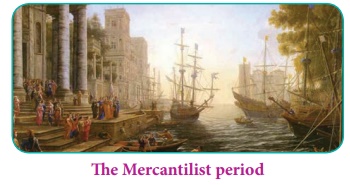Imperialism and its Onslaught | History - Rise of Imperialism | 12th History : Chapter 13 : Imperialism and its Onslaught
Chapter: 12th History : Chapter 13 : Imperialism and its Onslaught
Rise of Imperialism
Rise of Imperialism
(a) Dominance of Industrial Capital and Advocacy of Free Trade
It was believed in the seventeenth century that a
state’s greatness was dependent on commerce. It was natural, therefore, that
the interests of the state and of the merchant class became identical. The
Mercantilist period (1600–1700) was a period of accumulation of capital that
facilitated the industrial revolution in Europe. The leading powers of the
time, Holland, France and England, became major colonial powers with access to
overseas markets. Yet it was England, accomplishing industrial revolution
first, that emerged as the most powerful country. The export markets for
England existed initially in Europe. But as other countries began to
industrialise, the market for export of surplus manufactures had to be found
elsewhere.

Right from its inception Mercantilism had come
under attack. Excessive control of industry in France led to a demand for no
control of industry. Physiocrats in France strongly advocated free trade.
Laissez-faire, a word coined by a French businessman named de Gournay, became
the cry everywhere. Adam Smith, Scottish philosopher and economist, in his
influential book An Inquiry into the
Nature and Causes of the Wealth of
Nations (1776), criticised the colonial policy of the mercantilists and
argued for free trade and free market. His Wealth of Nations deeply influenced
the politicians of the time and paved the way for the great nineteenth-century
era of free trade.

Having earned huge profits out of its monopoly
trade, England decided on a free trade policy in 1833. Among the nations that
followed England in this respect were Belgium, the Netherlands, Norway,
Piedmont, Portugal, Spain, and Sweden. As a consequence, trade barriers were
reduced and the economies of western European nations boomed. The capitalism of
free competition (based on the principle of free trade without any control or
regulation by the state) later became the capitalism of monopolies. In the
battle of competition, as Marx observed, little business was either crushed by
big business or merged with it to make still larger big business. By the middle
of the nineteenth century partnerships and joint-stock companies were giving
way to trusts, followed by cartels. These powerful trusts and cartels
influenced governments.
Trusts are combinations of all or
nearly all of the producers of certain goods in order to control their price
and production. In the USA, heavy industry was organised through
trusts-association of companies which controlled production from the extraction
of raw materials to the disposal of finished products. Cartels are associations
of independent companies for the primary purpose of restricting competition in
the sale of their products. Cartels flourished because they enabled German
producers to gain great leverage in world trade.
Related Topics